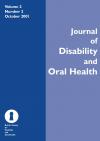Journal of Disability and Oral Health

- Cover Date:
- October 2001
- Print ISSN:
- 1470-8558
- Electronic ISSN:
- 1754-2758
- Vol:
- 2
- Issue:
- 2
Letters to the Editor
Journal of Disability and Oral Health (2001) 2/2 83–84
Madam, Re: Collard MM and Hunter ML, Oral care protocols for children receiving treatment for cancer. J Disab Oral Health 2001; 2: 15–17. The brief article by Collard and Hunter clearly raises c o n c e r n s regarding the provision of oral and dental health care for children requiring oncological care. I note, however, that the authors very rarely truly mention the management of the diseases that are likely to give the physician the greatest concern, namely mucositis, nor do they provide solutions to the problems they have found. Although there is no data to suggest that attending dental staff have any lack of awareness regarding mucosal disease, I would suggest that the paediatric oncologists are much more likely to want advice regarding the prevention and management of this rather than any dental problems of children. Mucositis has perhaps the greatest impact upon children receiving oncological care giving rise to both pain and being a potential portal of entry for further infection. It is this rather than any other aspect of the child that requires to be monitored during the early stages of treatment. While good oral hygiene care probably does lessen the mucositis, I would suggest that efforts should be directed towards minimising this oral problem than any hard tissue lesions unlikely to immediately compromise the child. Hopefully the recent report of the BSDH regarding the oncological management of oncological patients will have an impact upon the care of relevant children. I am unconvinced that any lack of appreciation or provision of ‘appropriate’ oral health care within paediatric oncolog y units is solely due to lack of knowledge within the attending medical team. If the attending dental staff are not aware of the real issues, and able to aid the prevention or treatment of these, then it is perhaps unsurprising if other aspects of oral health care are not given their due (or undue) attention. Stephen R. Porter Professor Department of Oral Medicine Eastman Dental Institute, London, WC1X 8LD Drs Collard and Hunter reply: We thank Professor Porter for highlighting the importance of mucosal disease in child patients receiving oncological care, and would reassure him that we appreciate that oral complications resulting from anti-cancer treatment can significantly affect morbidity, tolerance of treatment and quality of life. However, we would challenge his assertion that paediatric oncologists are much more likely to want advice regarding the prevention and management of oral mucosal disease rather than any other dental problems of children, since this is lacking in evidence. With eleven years combined experience of providing a Specialist Paediatric Dental service to one of the UKCCSG centres, we have recorded only three occasions on which we have been asked for advice regarding the management of oral mucosal lesions. In contrast, we are frequently asked to manage, or advise on the management of, the oral care of children who have either been noted to have dental disease at their pre-treatment oral assessment, or who unfortunately experience acute dental problems during treatment. On this basis, the study’s objective was limited to a determination of the extent to which dental preventive advice is incorporated in oral care protocols. Children with cancer represent a cross-section of the child population. Their dental caries experience can, therefore, be expected to reflect that of children in general. Up to 30% may have untreated caries and, as many are under the age of 5 years, they may not have previously had a dental examination (Fayle et al., 1992; Duggal et al., 1997). It is worthy of note that, in a recent study of 70 children diagnosed as suffering from Acute Lymphoblastic Leukaemia (Collard, 2000), it was reported that 20 children had not attended a dentist prior to diagnosis or had done so only when experiencing trouble with their teeth. In addition, the parents of twenty-six children were unable to recollect having received dietary advice, and those of thirtyseven children were unable to recollect having received oral hygiene advice. We would therefore reiterate our view that the inclusion of appropriate dental preventive advice is an essential component of oral care for children with cancer.
- Article Price
- £0.00
- Institution Article Price
- £0.00
- Page Start
- 83
- Page End
- 84
- Authors
Articles from this issue
- Title
- Pg. Start
- Pg. End
- The effect of topical metronidazole therapy and controlled oral hygiene procedures on periodontal disease in patients with Down syndrome – a clinical interventional study
- 54
- 62
- Day stay service for special needs patients requiring restorative dentistry – an audit of non attendance
- 63
- 65
- The oral health and treatment needs of adults with a learning disability living in private households in Lambeth, Southwark and Lewisham, London
- 78
- 82
